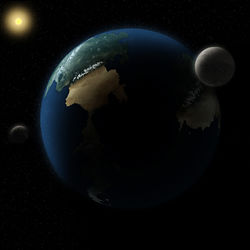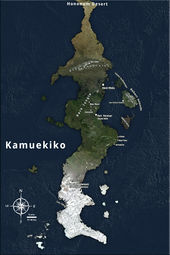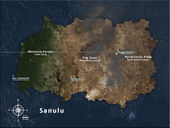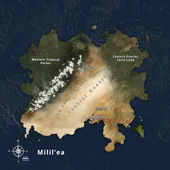|
|
| Line 77: |
Line 77: |
| === Owyhyee === | | === Owyhyee === |
| '''(pronounced: "O-wih-hee-ay")''' | | '''(pronounced: "O-wih-hee-ay")''' |
| | | [[File:Owyhyee.jpg|thumb|170px|left|Owyhyee]] |
| | |
| [[File:Owyhyee.jpg|thumb|180px|left|Owyhyee]] | |
| Owyhyee is situated in the North West Hemisphere and is 1,620 miles from east coast to west coast, and 1,450 miles from north coast to south coast. It is sparsely populated, encouraging a nomadic lifestyle, though it also houses the planetary seat of government, [[Menat Ombo]]. The vast grasslands of Owyhyee is home to countless species of both flora and fauna. Vast herds of beasts which the natives hunt for food and clothing support approximately 500,000 indigenous people divided into hundreds of small communities. Several major rivers flow across this area, fueled by countless snow melt tributaries nestled deep in the continent's central mountain range. The grasslands in the east of the continent are split from the Honunom desert by a small mountain chain that reaches an average height of 2,000 meters. The vast height of the mountains discourages the natives from passing over them, however notable villages in the primary passes to the Honunom desert command trade through the region. | | Owyhyee is situated in the North West Hemisphere and is 1,620 miles from east coast to west coast, and 1,450 miles from north coast to south coast. It is sparsely populated, encouraging a nomadic lifestyle, though it also houses the planetary seat of government, [[Menat Ombo]]. The vast grasslands of Owyhyee is home to countless species of both flora and fauna. Vast herds of beasts which the natives hunt for food and clothing support approximately 500,000 indigenous people divided into hundreds of small communities. Several major rivers flow across this area, fueled by countless snow melt tributaries nestled deep in the continent's central mountain range. The grasslands in the east of the continent are split from the Honunom desert by a small mountain chain that reaches an average height of 2,000 meters. The vast height of the mountains discourages the natives from passing over them, however notable villages in the primary passes to the Honunom desert command trade through the region. |
|
| |
|
| Line 87: |
Line 85: |
|
| |
|
| === Kamuekiko === | | === Kamuekiko === |
| | [[File:Kamuekiko.jpg|thumb|170px|right|Kamuekiko]] |
| '''(pronounced: "Ka-mue-kee-ko")''' | | '''(pronounced: "Ka-mue-kee-ko")''' |
|
| |
|
| |
| [[File:Kamuekiko.jpg|thumb|270px|left|Kamuekiko]]
| |
| Situated directly South of Owyhyee, Kamuekiko is attached to the Northern continent by a narrow isthmus of desertified land. The continent itself is covered in tropical rainforest which eventually tapers into a mountain range. Despite the relative geological calmness, there are occasional earthquakes in the area. To the southwest the land is dominated by rocky plains, where limestone and chalk outcroppings are common. | | Situated directly South of Owyhyee, Kamuekiko is attached to the Northern continent by a narrow isthmus of desertified land. The continent itself is covered in tropical rainforest which eventually tapers into a mountain range. Despite the relative geological calmness, there are occasional earthquakes in the area. To the southwest the land is dominated by rocky plains, where limestone and chalk outcroppings are common. |
|
| |
|
| Line 101: |
Line 97: |
| === Sanulu === | | === Sanulu === |
| '''(pronounced: “San-u-lu")''' | | '''(pronounced: “San-u-lu")''' |
| | | [[File:Sanulu.jpg|thumb|170px|left|Sanulu]] |
| | |
| [[File:Sanulu.jpg|thumb|180px|left|Sanulu]] | |
| Situated in the North Eastern Hemisphere of '''New''' '''Tython''', Sanulu is the smallest of the four continents of '''New''' '''Tython''', consisting of an extreme climate due to the constantly erupting volcano-networks permeating its rugged geography. The constant flow of lava increases the size of the continental shelf by up to five miles per year (depending on yearly flow-size). Due to the ash thrown up into the atmosphere, the air above the interior of the continent is high in nitrogen and carbon dioxide making it unsuitable for sentient habitation, though there are minor settlements on the more temperate and geologically calmer coastlines. | | Situated in the North Eastern Hemisphere of '''New''' '''Tython''', Sanulu is the smallest of the four continents of '''New''' '''Tython''', consisting of an extreme climate due to the constantly erupting volcano-networks permeating its rugged geography. The constant flow of lava increases the size of the continental shelf by up to five miles per year (depending on yearly flow-size). Due to the ash thrown up into the atmosphere, the air above the interior of the continent is high in nitrogen and carbon dioxide making it unsuitable for sentient habitation, though there are minor settlements on the more temperate and geologically calmer coastlines. |
|
| |
|
| Sanulu is small in size compared to the other three continents, measuring only 800 miles from its east to west coast and 369 miles from its north to south coast. However, it is growing each year. It is calculated that if it continues to grow in size at its current pace, the continent will rival Kamuekiko in size in approximately 3,000 years time. | | Sanulu is small in size compared to the other three continents, measuring only 800 miles from its east to west coast and 369 miles from its north to south coast. However, it is growing each year. It is calculated that if it continues to grow in size at its current pace, the continent will rival Kamuekiko in size in approximately 3,000 years time.<br> |
|
| |
|
| === Milil’ea === | | === Milil’ea === |
| '''(pronounced: "Me-lil-ee-ah")''' | | '''(pronounced: "Me-lil-ee-ah")''' |
| | | [[File:Mililea.jpg|thumb|170px|right|Milil'ea]] |
| | |
| [[File:Mililea.jpg|thumb|180px|left|Milil'ea]] | |
| Milil'ea is the second largest continent of '''New''' '''Tython''' and it has the biggest number of different habitats within its interior. These range from perpetual tundra in the far south of the continent, to desert within the centre of the continent. In the north of Milil'ea is a vast grassland area, that is dotted with signs of glaciation in the past, fallen stones that had been dragged hundreds of miles from their source. | | Milil'ea is the second largest continent of '''New''' '''Tython''' and it has the biggest number of different habitats within its interior. These range from perpetual tundra in the far south of the continent, to desert within the centre of the continent. In the north of Milil'ea is a vast grassland area, that is dotted with signs of glaciation in the past, fallen stones that had been dragged hundreds of miles from their source. |
|
| |
|

|
| New Tython (Harakoa)
|
|
Outer Rim Territories
|
|
Esstran sector
|
|
DLSCX-2298 (Yhi System)
|
|
1: Yhi
|
|
2: Iah, Kalfu
|
|
1.1 AU
|
|
389 Standard Days
|
|
Terrestrial
|
|
9,645 km
|
|
Type I
|
|
-20 to 48˚C
|
|
1.23 x Standard
|
|
Variable
|
|
|
|
Harakoans
|
|
Humans, Mon Calamari, Various Species
|
|
Basic, Harakose
|
- ~100,000 Human Colonists
- ~50,000 Mon Calamari Colonists
- ~12,000 Bothan Colonists
- ~300,000,000 Natives
|
|
Menat Ombo, Dac Compound
|
|
None
|
|
None
|
|
Odan-Urr
|
New Tython, known as Harakoa to the native people, is the planet under control of the Thuron Monarchy. The forces of Odan-Urr fight there, to liberate the world.
Thuronian Positions
Menat Ombo
- Main article: [[Menat Ombo|Menat Ombo]]
Located on Owyhyee, this fortress is the only true city on the planet and is the heart and soul of the Thuron Monarchy. Fortified by no less than one hundred thousand troops, the city has seen radical renovations to include massive walls, gun turrets, and garrisons throughout. The Ordain Vonoro Spaceport has become a mass of Thuronian fighters, with landing pads on rooftops giving additional parking space. The Visulu and Memit Districts have been littered with armored vehicles, checkpoints, and soldiers - the battle to retake the city will be a fierce one. Finally, on the ruins of the old Ooroo Abbey, the Thuronian Palace stands tall - the fortress from which Cy Thuron himself gives his dark orders.
- Infantry: 100,000 Soldiers
- Armor: 1,500 Armored Vehicles
- Air Support: 50 Starfighters, 25 Bombers
Tanduran Settlement
Once a colony called a Hospice, the Tanduran Settlement has been largely militarized, with its central buildings clustered up behind a wall. Surrounded by farmsteads turned to either massive industrial farms or strip mines, and littered with mines, blast debris, and trenches, the approach to the town will be a merciless one for the Odanite forces. At the town's center, a shield generator prevents aerial assault, as anti-air defenses stop dropship deployments and para-trooper infiltration; the battle will be long and bloody, and will stretch across the ground.
- Infantry: 60,000 Soldiers
- Armor: 300 Armored Vehicles
- Air Support: 15 Starfighters, 10 Bombers
Vard Mislu
A Colony once known for being insular and humanocentric, the close-knit buildings of Vard Mislu have been turned into a fortress for Thuron. Anti-air and artillery emplacements litter the hilly terrain nearby, as armor and gun emplacements have turned the homes of thousands into buildings of war. Prisoner camps hold the civilians close to buildings of infrastructure, an attempt to stop the Jedi from bombing them; it will take elite teams to crack these camps and arm the people for rebellion. Guaranteed to be bloody and close, the street-to-street, room-to-room fighting here will leave this colony forever changed - both in attitude, and in structure.
- Infantry: 50,000 Soldiers
- Armor: 200 Armored Vehicles
- Air Support: 10 Starfighters, 8 Bombers
Dac Compound
Stationed six nautical miles off of Sanulu, the Dac Compound is a mass of arches, domes, and towers, built on an island and outward to float upon the waters. Garrisoned by Cy Thuron's forces, the floating fortress is his means of supplying the planet. Forces from here can move to and from anywhere on the world, and have recently scattered forces to all corners of the planet. Gun towers and landing pads dot the colony, as armored forces patrol the streets. That said, it has the smallest garrison of infantry - and is heavily reliant on harmony within, making the innards of the Compound Odan-Urr's first target.
- Infantry: 50,000 Soldiers
- Armor: 150 Armored Vehicles
- Air Support: 10 Starfighters, 6 Bombers
Geography
There are four continents on New Tython; ranging from the gigantic continent of Owyhyee in the North West Hemisphere, which has a wide range of different climates (including deserts and grassy plains), to the smallest continent of Sanulu covered in mountain ranges peppered by dozens of semi-active volcanoes, resulting in the region being christened "The Inferno" by the various native populations.
Apart from Owyhyee and Sanulu, there are the two other continents of Kamuekiko and Milil’ea, as well as various islands spread across the oceans of the planet. One such grouping of islands approximately 250 kilometers off the west coast of Sanulu has never been colonized by native or immigrant populations, owing primarily to the fact that they are composed almost entirely of volcanic rock and glass and have no native wildlife upon them.
Owyhyee
(pronounced: "O-wih-hee-ay")
 Owyhyee
Owyhyee
Owyhyee is situated in the North West Hemisphere and is 1,620 miles from east coast to west coast, and 1,450 miles from north coast to south coast. It is sparsely populated, encouraging a nomadic lifestyle, though it also houses the planetary seat of government, Menat Ombo. The vast grasslands of Owyhyee is home to countless species of both flora and fauna. Vast herds of beasts which the natives hunt for food and clothing support approximately 500,000 indigenous people divided into hundreds of small communities. Several major rivers flow across this area, fueled by countless snow melt tributaries nestled deep in the continent's central mountain range. The grasslands in the east of the continent are split from the Honunom desert by a small mountain chain that reaches an average height of 2,000 meters. The vast height of the mountains discourages the natives from passing over them, however notable villages in the primary passes to the Honunom desert command trade through the region.
The Honunom desert reaches a max temperature of 48 degrees Celsius during the day in summer, but is prone to plunging well below freezing at night. Life is sparse in the desert, as is water, but there are several oases spread across the desert where they tap into the deep water table.
On the other side of the desert, if one manages to travel through it, is another expanse of grassland punctuated by forests which have been partially cleared and plundered to make room for the capital of Menat Ombo and the dozens of colonial and sedentary farms clustered around the small city. The capital is situated on the banks of the vast, turbulent River Sabina, which is prone to seasonal flooding, and eventually flows into the Bythic Ocean.
Kamuekiko
 Kamuekiko
Kamuekiko
(pronounced: "Ka-mue-kee-ko")
Situated directly South of Owyhyee, Kamuekiko is attached to the Northern continent by a narrow isthmus of desertified land. The continent itself is covered in tropical rainforest which eventually tapers into a mountain range. Despite the relative geological calmness, there are occasional earthquakes in the area. To the southwest the land is dominated by rocky plains, where limestone and chalk outcroppings are common.
The rainforests are largely unexplored by the colonists or Jedi due to the dense undergrowth which prevents travel of large groups. However, drawing from the superstition of populations bordering the area, one can assume there are tribes living within. The coasts have many natural (including some deep water) harbors. The rocky plains below the rainforest have a weakened presence of natives due to the established colony of Mon Calamarians. Unable to compete with the settlers, the natives have migrated further north towards the edges of the rainforests.
The isthmus between Owyhyee and Kamuekiko is part of the Honunom desert, which often discourages migration between the two continents.
Kamuekiko is a narrow continent, but quite long, stretching down to the 48th degree of longitude. This is the cause of the extremely cold weather in winter. The continent measures 2,764 miles from the isthmus between Owyhyee and Kamuekiko to the southern tip. From the east to west coasts, it measures only 800 miles at the widest point. Off the west coast of Kamuekiko lays an archipelago, consisting of hundreds of tiny islands.
Sanulu
(pronounced: “San-u-lu")
 Sanulu
Sanulu
Situated in the North Eastern Hemisphere of New Tython, Sanulu is the smallest of the four continents of New Tython, consisting of an extreme climate due to the constantly erupting volcano-networks permeating its rugged geography. The constant flow of lava increases the size of the continental shelf by up to five miles per year (depending on yearly flow-size). Due to the ash thrown up into the atmosphere, the air above the interior of the continent is high in nitrogen and carbon dioxide making it unsuitable for sentient habitation, though there are minor settlements on the more temperate and geologically calmer coastlines.
Sanulu is small in size compared to the other three continents, measuring only 800 miles from its east to west coast and 369 miles from its north to south coast. However, it is growing each year. It is calculated that if it continues to grow in size at its current pace, the continent will rival Kamuekiko in size in approximately 3,000 years time.
Milil’ea
(pronounced: "Me-lil-ee-ah")
 Milil'ea
Milil'ea
Milil'ea is the second largest continent of New Tython and it has the biggest number of different habitats within its interior. These range from perpetual tundra in the far south of the continent, to desert within the centre of the continent. In the north of Milil'ea is a vast grassland area, that is dotted with signs of glaciation in the past, fallen stones that had been dragged hundreds of miles from their source.
To the west is a large rainforest, where the native species prosper, the area unexploited by the settlers that descended upon New Tython. The rainforest abruptly tapers into a large mountain range that are the result of shifting tectonic plates hundreds of millions of years ago, however earthquakes do habitually occur, causing landslides and flooding when the rains come.
To the south of the mountain range lies the vast tundra, populated mainly by migrating tribes that follow the vast herds of the native arctic species.
The east side of Milil'ea is heavily populated by farming communities, taking advantage of the large amount of rivers in the east of Milil'ea. Dotted in between the farms are a series of woodlands and lakes that attract Mon Calamarian settlers.
The desert in the centre of Milil'ea is slowly expanding to the east as desertification occurs due to the over-farming of the land by the settlers, a problem that the Acolytes of Odan-Urr hope to stem.
Milil'ea is 1,670 miles from north to south at its widest point, while it measures 1,540 miles from east to west, a truly vast continent.